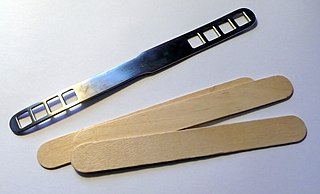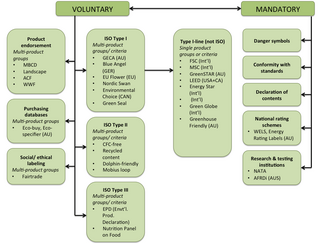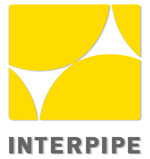
Fujifilm Holdings Corporation, trading as Fujifilm, or simply Fuji, is a Japanese multinational conglomerate headquartered in Tokyo, Japan, operating in the realms of photography, optics, office and medical electronics, biotechnology, and chemicals.

The United Nations Global Compact is a non-binding United Nations pact to get businesses and firms worldwide to adopt sustainable and socially responsible policies, and to report on their implementation. The UN Global Compact is the world's largest corporate sustainability and corporate social responsibility initiative, with 13000 corporate participants and other stakeholders over 170 countries. The organization consists of a global agency, and local "networks" or agencies for each participating country. Under the Global Compact, companies are brought together with UN agencies, labor groups and civil society. Cities can join the Global Compact through the Cities Programme.

Beckman Coulter, Inc. is a Danaher Corporation company that develops, manufactures, and markets products that simplify, automate and innovate complex biomedical testing. It operates in two industries: Diagnostics and Life Sciences. For more than 80 years, Beckman Coulter Inc. has helped healthcare and laboratory professionals, pharmaceutical and biotechnology companies, universities, medical schools, and research institutions worldwide.

Ophthalmoscopy, also called funduscopy, is a test that allows a health professional to see inside the fundus of the eye and other structures using an ophthalmoscope. It is done as part of an eye examination and may be done as part of a routine physical examination. It is crucial in determining the health of the retina, optic disc, and vitreous humor.

A medical device is any device intended to be used for medical purposes. Significant potential for hazards are inherent when using a device for medical purposes and thus medical devices must be proved safe and effective with reasonable assurance before regulating governments allow marketing of the device in their country. As a general rule, as the associated risk of the device increases the amount of testing required to establish safety and efficacy also increases. Further, as associated risk increases the potential benefit to the patient must also increase.

Ecolabels and Green Stickers are labeling systems for food and consumer products. The use of ecolabels is voluntary, whereas green stickers are mandated by law; for example, in North America major appliances and automobiles use Energy Star. They are a form of sustainability measurement directed at consumers, intended to make it easy to take environmental concerns into account when shopping. Some labels quantify pollution or energy consumption by way of index scores or units of measurement, while others assert compliance with a set of practices or minimum requirements for sustainability or reduction of harm to the environment. Many ecolabels are focused on minimising the negative ecological impacts of primary production or resource extraction in a given sector or commodity through a set of good practices that are captured in a sustainability standard. Through a verification process, usually referred to as "certification", a farm, forest, fishery, or mine can show that it complies with a standard and earn the right to sell its products as certified through the supply chain, often resulting in a consumer-facing ecolabel.

QIAGEN is a provider of sample and assay technologies for molecular diagnostics, applied testing, academic and pharmaceutical research. The company operates in more than 35 offices in over 25 countries. QIAGEN N.V., the global corporate headquarter of the QIAGEN group, is located in Venlo, The Netherlands. European, American, and Asian regional headquarters are located in respectively Hilden, Germany; Germantown, Maryland United States; and Shanghai, China. QIAGEN's shares are listed at the NYSE and at the Frankfurt Stock Exchange in the Prime Standard. Thierry Bernard is the company's Chief Executive Officer(CEO). The main operative headquarters are located in Hilden, Germany.

Dermatoscopy also known as dermoscopy or epiluminescence microscopy, is the examination of skin lesions with a dermatoscope. It is a tool similar to a camera to allow for inspection of skin lesions unobstructed by skin surface reflections. The dermatoscope consists of a magnifier, a light source, a transparent plate and sometimes a liquid medium between the instrument and the skin. The dermatoscope is often handheld, although there are stationary cameras allowing the capture of whole body images in a single shot. When the images or video clips are digitally captured or processed, the instrument can be referred to as a digital epiluminescence dermatoscope. The image is then analyzed automatically and given a score indicating how dangerous it is. This technique is useful to dermatologists and skin cancer practitioners in distinguishing benign from malignant (cancerous) lesions, especially in the diagnosis of melanoma.

Topcon Corporation is a Japanese manufacturer of optical equipment for ophthalmology and surveying.
Welch Allyn, Inc. is an American manufacturer of medical devices and patient monitoring systems. Headquartered in Skaneateles Falls, New York, it was family-owned until it was acquired in 2015 by Hillrom. Hillrom was purchased by Baxter International in 2021.

Interpipe Group, or simply Interpipe, is a Ukrainian industrial company, a global producer of steel pipes and railway wheels. Interpipe headquarters and production facilities are located in Nikopol, Ukraine. The network of sales offices covers the key markets of Ukraine, CIS, Middle East, North America, and Europe.

The Global Reporting Initiative is an international independent standards organization that helps businesses, governments, and other organizations understand and communicate their impacts on issues such as climate change, human rights, and corruption.
Siemens Healthineers is a German company which provides healthcare solutions and services. It was spun off from its parent company Siemens in 2017, which retains a 75% stake. Siemens Healthineers is the parent company for several medical technology companies and is headquartered in Erlangen, Germany.
ISO 13485Medical devices -- Quality management systems -- Requirements for regulatory purposes is a voluntary standard, published by International Organization for Standardization (ISO) for the first time in 1996, and contains a comprehensive quality management system for the design and manufacture of medical devices. The latest version of this standard supersedes earlier documents such as EN 46001 and EN 46002 (1996), the previously published ISO 13485, and ISO 13488.
The Luer taper is a standardized system of small-scale fluid fittings used for making leak-free connections between a male-taper fitting and its mating female part on medical and laboratory instruments, including hypodermic syringe tips and needles or stopcocks and needles. Currently ISO 80369 governs the Luer standards and testing methods.
ISO 14971Medical devices — Application of risk management to medical devices is a voluntary standard for the application of risk management to medical devices. "Voluntary standards do not replace national laws, with which standards' users are understood to comply and which take precedence" over voluntary standards such as ISO 13485 and ISO 14971. The ISO Technical Committee responsible for the maintenance of this standard is ISO/ TC 210 working with IEC/SC62A through Joint Working Group one (JWG1). This standard is the culmination of the work starting in ISO/IEC Guide 51, and ISO/IEC Guide 63. The third edition of ISO 14971 was published in December 2019 and supersedes the second edition of ISO 14971.

Hach Company manufactures and distributes analytical instruments and reagents used to test the quality of water and other liquid solutions. Manufactured and distributed worldwide, Hach systems are designed to simplify analysis by offering on-line instrumentation, portable laboratory equipment, prepared reagents, easy-to-follow methods, and technical support.
Fabasoft AG is a software manufacturer headquartered in Linz, Upper Austria. The company was established in 1988 by Helmut Fallmann and Leopold Bauernfeind.
Environmental certification is a form of environmental regulation and development where a company can voluntarily choose to comply with predefined processes or objectives set forth by the certification service. Most certification services have a logo which can be applied to products certified under their standards. This is seen as a form of corporate social responsibility allowing companies to address their obligation to minimise the harmful impacts to the environment by voluntarily following a set of externally set and measured objectives.

Friwo Gerätebau GmbH is a German company, headquartered in Ostbevern, Germany. Its origin can be traced back to 1881. Since the development of the first power supply unit in 1971, the company operates worldwide and manufactures battery chargers, battery packs, power supplies, LED drivers and drive units. The company also provides electronic design and manufacturing services (E²MS) in Europe.













